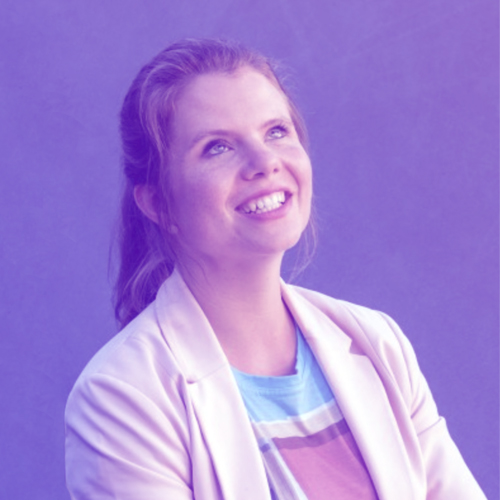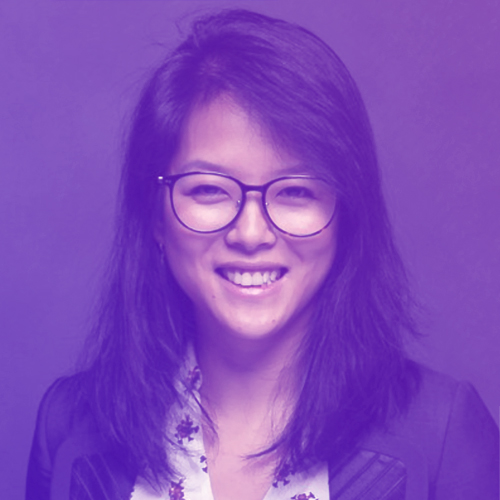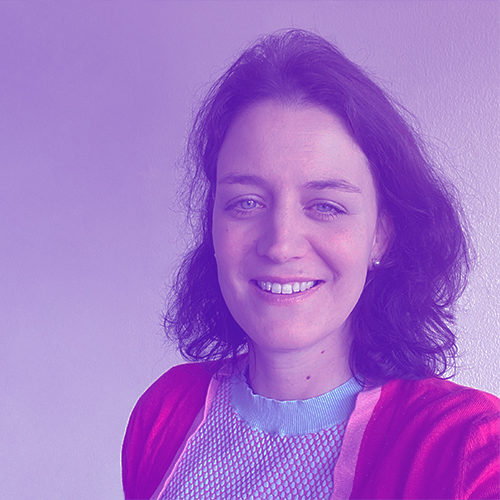Get inspired by our Women in Data
Data enthusiasm that opens new doors
Laura-Luisa Velikonja is a Senior Data Scientist at Telefónica Germany / o2. In her work, she uses machine learning to help the various business units make better and faster decisions.

A new perspective.
I grew up in Mönchengladbach and moved to Munich to study mathematics, where I focused on optimization mathematics during my studies. The studies were challenging and demanded a lot of hard work. I still remember that I had to adjust to this new way of learning that mathematics demanded from my fellow students and me. This also put my resilience to the test, but at the same time strengthened it a lot. To this day, I benefit from having learned to delve into content and details and, above all, to stick with it even when things get difficult.
During my mathematics degree, I kept hearing from my lecturers that I could do anything with mathematics. It was precisely the vast choices that made it so challenging to commit to a single discipline. I always saw myself as more of a generalist who liked to try my hand at a wide variety of student jobs and industries. At first, I toyed with the idea of getting a foothold in the logistics industry and only came to data science by happy accident. My bachelor thesis supervisor, who I had kept in touch with, was working in a data science consultancy in Munich at the time. Through an employee recruitment program she shared online, I then became aware of the company and chose to start my career there. Maintaining and expanding contacts is therefore very important to me to this day. Data science gave me the feeling for the first time that I could tackle and combine many different tasks and interests. That’s why I’ve never regretted taking the path into the world of data.
Not letting anything or anyone hold us back.
I believe that it’s not so much due to women themselves that they are underrepresented in technical professions. I think it comes back to the fact that many women do not feel attracted to STEM professions in the environment in which these women live and in the way they have been socialized. I myself was lucky in this regard. A teacher at the time recognized my talent for mathematics and logic and decided to specifically encourage and motivate me. This gave me the confidence I needed to enroll in a degree program in mathematics and thus embark on my career path.
“People who motivate and support boys and girls early on are critical to getting them equally engaged in pursuing these all-important career fields.”
Today, I particularly love the versatility of my work as a data scientist. This is evident both in the topics I get to work on and in the numerous methods and tools I use during my work. This means I never get bored in my day-to-day work and I always learn something new.

For me personally, data jobs are incredibly exciting and everyone I tell about my work is thrilled by the exciting field of tasks. Unfortunately, many feel put off by the mathematical component and programming, which plays a greater role as a data scientist than for the job of data analyst. I see an urgent need for action here in particular, because this bias and fear of contact with mathematics and STEM subjects in general often starts at an early age. I am convinced that more girls and young women should be inspired to take up science subjects – not just the boys, for example, through such great initiatives as the annual Girls’ Day. Role models can help show these girls that women can also not only like math and programming, but even love it and succeed in technical professions.
Recognizing and exploiting opportunities.
I’m a firm believer that mixed teams produce better results in any industry – all the more reason why women should work in IT and data. The female perspective helps previously more male-dominated teams be more creative and tackle the problems of an increasingly complex world together. However, I also believe that there is still a long way to go to achieve gender diversity in the IT and data world and that is exactly why I would also like to appeal to companies to encourage more women and greater diversity. Issues such as unconscious bias and work-life balance are, in my view, the main reasons that make it difficult for well-educated women to pursue a career in this environment. However, the ethical and moral issues that data teams in particular should address require as many, diverse perspectives as possible, especially those from social groups that are underrepresented in data or have been historically disadvantaged. In addition, numerous job roles exist in IT and data that do not require years of programming experience and are thus open to people switching careers who have an interest in analytics and want to help shape the future. The key, therefore, is for everyone to take advantage of these opportunities, find something that suits their talents and interests, and then act boldly. “Just go for it!”
Your application
Ready for your new data career? Apply for your "Women in Data" scholarship!
Saving and improving lives with data
Dr. Yen Hoang is an Educational Data Scientist at StackFuel. Yen was born in Ho Chi Minh City, Vietnam and came to Berlin with her parents when she was four years old, where she grew up in Friedrichshain.

An algorithm can change the world.
With a strong passion for bioinformatics, I earned my PhD from the University of Potsdam in 2019 and worked with my research group to develop an algorithm to better and more reliably identify peanut allergies. Still without a wealth of practical experience in my hand luggage, I analyzed the data of a breast cancer patient using the latest methods for one of my first projects as a graduate research associate for Kansas University Medical Center, in Kansas City, USA. The patient’s cancer therapies had so far failed to produce the desired results, so the main hope was to develop an individualized gene therapy. To do this, I set out to track down the few nucleic bases of genes that had mutated. I still remember how afraid I was of making mistakes and how seriously I took this life-saving task. At the same time, I felt honored to be involved in something as important as saving a human life. From that point on, I dedicated my heart and mind to data science. Working with data often reminds me of learning a language. The different applications are like dialects, but the core remains the same. Even though I come from a medical background, I can quickly adapt my knowledge to other fields and easily recognize the most important key messages when discussing analysis approaches. This enables me to analyze even sales or tracking data without difficulty. But I also had to face several hurdles. I wrote my dissertation during a difficult period in my life, when things were not always easy in my private life either. But I didn’t want to be held back, so I started meditating daily, channeling my discipline into regular exercise, and changing my mindset. Gradually, I found my own way to write in a structured way and I found my way back to joy. Today I am more than happy with the result and my career.
Data is also a woman's business.
I see no reason why a lot more women shouldn’t work in IT and data science. Even though women are currently underrepresented, in an ideal world, I would like to see teams with a balanced number of men and women. In my opinion, women have a different perspective and preferences for approaches, tools and technical devices than men. To make products, services or even therapies work for all genders, I see more women in development, programming and strategy as a must. It may sound simplistic, but for me, women also bring more harmony and empathy to teams. In diverse teams, that makes for an improved sense of team and, as a result, a strengthened sense of well-being for all employees. And customers benefit, too, in that products designed for women or for everyone are no longer developed by men alone. This is how what were once “boys clubs” end up becoming true winning teams.
But it’s not just the world of data that benefits from more women, it’s also the other way around. I might be the best example of this. I have always enjoyed discovering and trying new things, but don’t rush headlong into every adventure.

I like to find out about the things that excite me and share my experiences with those around me. For me, data is a way to prove my own intuition. Instead of relying on enticing advertising promises and extroverted spokespeople, data gives me the real insights. It doesn’t matter whether if you’re using data for a hobby or to determine globally how humans, animals, or the environment are doing. Those who understand it can also make a difference and make the world a little better, for themselves and for others.
Dolls for girls, programming for boys? That's over now.
In order to inspire more women to pursue careers in data, I would like to see several, societal changes. I see the roots of the problem in the early years of childhood, when parents raise their children too much according to stereotypes. Dolls and pink for girls, fire engines and blue for boys. Girls should also be encouraged more in school to take an interest in science and programming. I believe that a mandatory, legal quota for women in IT and data departments above a certain company size would positively support change. Why should they only apply to leadership positions, when they could also be beneficial within teams. I would like children to experience that it is just as normal for women to work in science and with data as it is for men. Then, after just one generation, we will no longer need to impose a quota. Conversely, men should also be encouraged to enter female-dominated professions such as nursing. Diversity is important in all areas of life.
I would like to give women hope. I have experienced myself how difficult it can be as a woman to gain a foothold in a technical profession and to get a chance. That’s why I particularly urge women not to underestimate themselves and to believe in their own abilities and strengths. And that’s exactly why the field of data science is ideal, because here the code you’ve written tells the story of your hard work. I would also advise women not to be shy about showing their achievements and certificates.
“Believe in yourself. Be strong. And remember how much you’ve already accomplished. Then you’ll realize what else you can achieve. Just take the first step.”
Actively shaping change
Dr. Verena Braunschober has been working as a Senior Data Analyst in Data Analytics & Artificial Intelligence at Telefónica Germany / o2 in Munich for almost nine years. In this interview, she talks about how she developed a passion for data and how StackFuel’s course helped her on her career path. How do you actually become a data analyst?

Versatility as a strength.
Many roads lead to Rome, mine led from Mainz to Munich. Data has always played a role in my life: I originally come from the lively city of Mainz, where I’d spent more than half of my life so far. After school, I studied business administration there at the Johannes Gutenberg University and focused on statistics and econometrics early on. In my studies I already learned quickly that I really liked the very methodical work and the analysis of data with modern technologies. A great professor, who later also became my doctoral supervisor, was instrumental in getting me excited about the subject.
After a practical phase of almost four years as a research assistant at the Federal Statistical Office in Wiesbaden, I returned to my home university and did my doctorate at my old institute for statistics and econometrics. During this time, I looked at the statistical methods that can be used to analyze and predict travel flows to Germany. After another three years at a payment service provider Atos Worldline in business analysis, I had to move to Munich for private reasons. This opened up the opportunity for me to start working at Telefónica Germany / o2 as a data analyst, which was exactly what I wanted and what my talents were. Suddenly, I had the wealth of data of a telecommunications company with around 43 million mobile connections at my disposal. In my diploma thesis, I had still only been working on about 100 data entries.
Promoting and driving diversity.
I’m a very analytical person who likes to compile facts, plan things, and even in my private life I like to tackle a project with excel spreadsheets. At the same time, I love working in a team and making decisions together based on data and facts. I have always enjoyed using digital tools, as they make my life easier in many areas. Since I work in a technical profession, where there are unfortunately still very few women, I was and am often the only woman in many meetings. In the past, I tended to be reserved and just wait-and-see in larger meetings, and my opinions and experience were not always heard. It was only through my first female boss and the founding of TelefónicaConnects (a company-wide community to promote gender equality at Telefónica Germany / o2) that I learned the following: It is important to be visible and to make your voice heard in order to be involved in decisions. Sometimes it also just takes a bit of practice and courage.
Since there are still very few women in technical fields, many (young) women simply lack role models and certainly also the precise idea of what this kind of profession entails. It is a very exciting job where there are virtually no boring days. I am constantly confronted with new and varied questions. For example, we are currently analyzing what reasons there may be why a customer is dissatisfied with us and how we can counteract this.

Every day, we work in teams with people from a wide variety of backgrounds, and I often learn how to use the latest digital technologies along the way. I think digital skills and the ability to make data-driven decisions are essential for the current and future world of work. It has also always been important to me to be independent and earn my own money. The fact that I can combine all of this in my analytics job gives me enormous satisfaction. I now also do my annual personal financial planning with Python, which I was able to learn in a StackFuel course. This has enabled me to identify and weed out things that burn money.
This is why you don't have to be a programming professional.
I had a lot of fun learning modern tools like Python. I hadn’t worked with that myself before. Even though I might have thought beforehand that I had already learned so much in the past and didn’t need that as well. But far from it: I work in an environment that changes very quickly. And so the Stackfuel course helped me a lot to learn new things from the world of data. And that’s exactly what I like: The daily tasks in my job are always super exciting and I never stop learning.
I also think it’s important to emphasize that: You can also be good at this job if you’re not an absolute programming geek. Often, the job is all about understanding contexts, discovering creative solutions, and ultimately coming up with feasible – and often pragmatic – results. You don’t have to be a business economist or mathematician to do this. In my team, geographers and sociologists also work as enthusiastic data analysts. So I can only recommend that you take a closer look at the job. Maybe even on Girls’ Day at Telefónica Germany / o2 or as part of university events or modern (digital) meetups. I am also trying to introduce my daughter, who is only six years old, to these topics at an early age to give her the opportunity to try things out and gain experience. Especially as a data analyst, I am aware that algorithms and models are only as good as the data we feed them with. In analytical modeling, we should therefore always ask ourselves whether all the important aspects have been taken into account. The best way to do this is to look at things from different angles. A diverse team will recognize much more quickly than a very homogeneous team that certain aspects are not covered. I think it’s important that we always take diverse opinions and ideas into account in teams in order to look at a topic holistically. Especially in data analysis, this is very important to avoid biased analysis results. It’s not just about men and women, but people with a wide variety of experiences and backgrounds.
Take your chance and apply for your Women in Data scholarship!
Data analytics is arguably one of the most sought-after skills of the decade. In almost all departments, such as marketing or finance, we need experts who can perform data analyses. So far, women have been underrepresented in this field. Until now! Show the world you’re ready for the dream of a fulfilling data career and snag one of the 50 coveted “Women in Data” scholarships.

